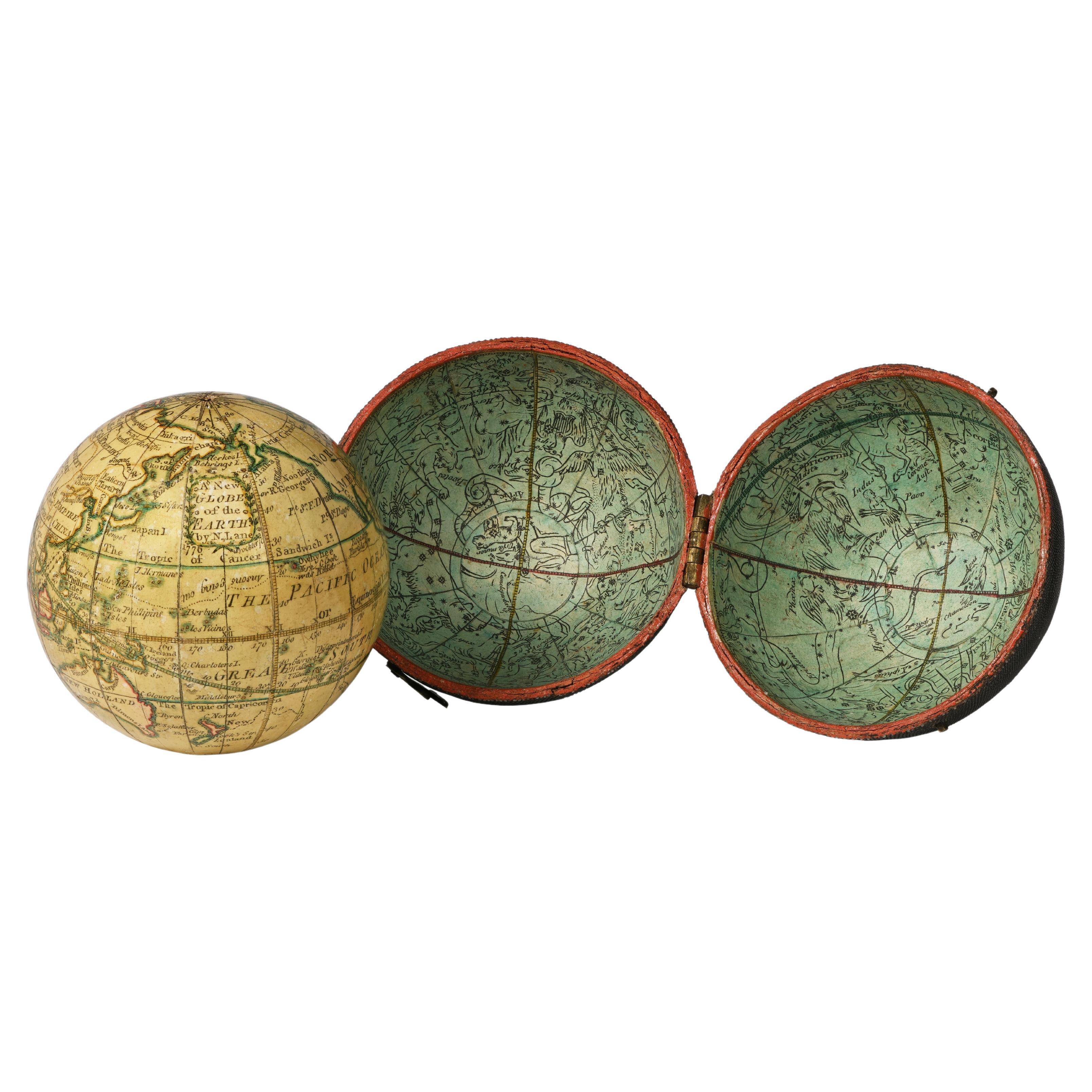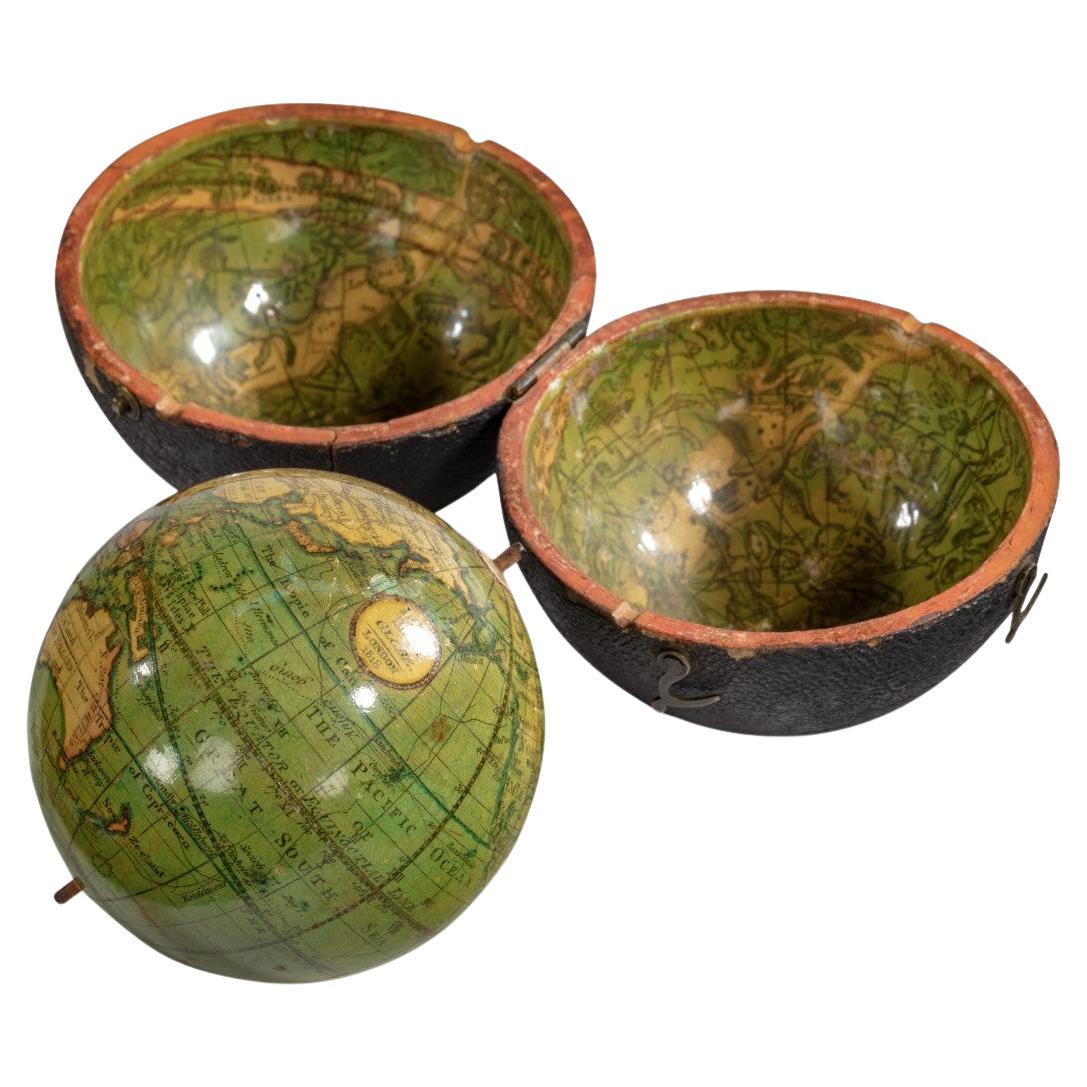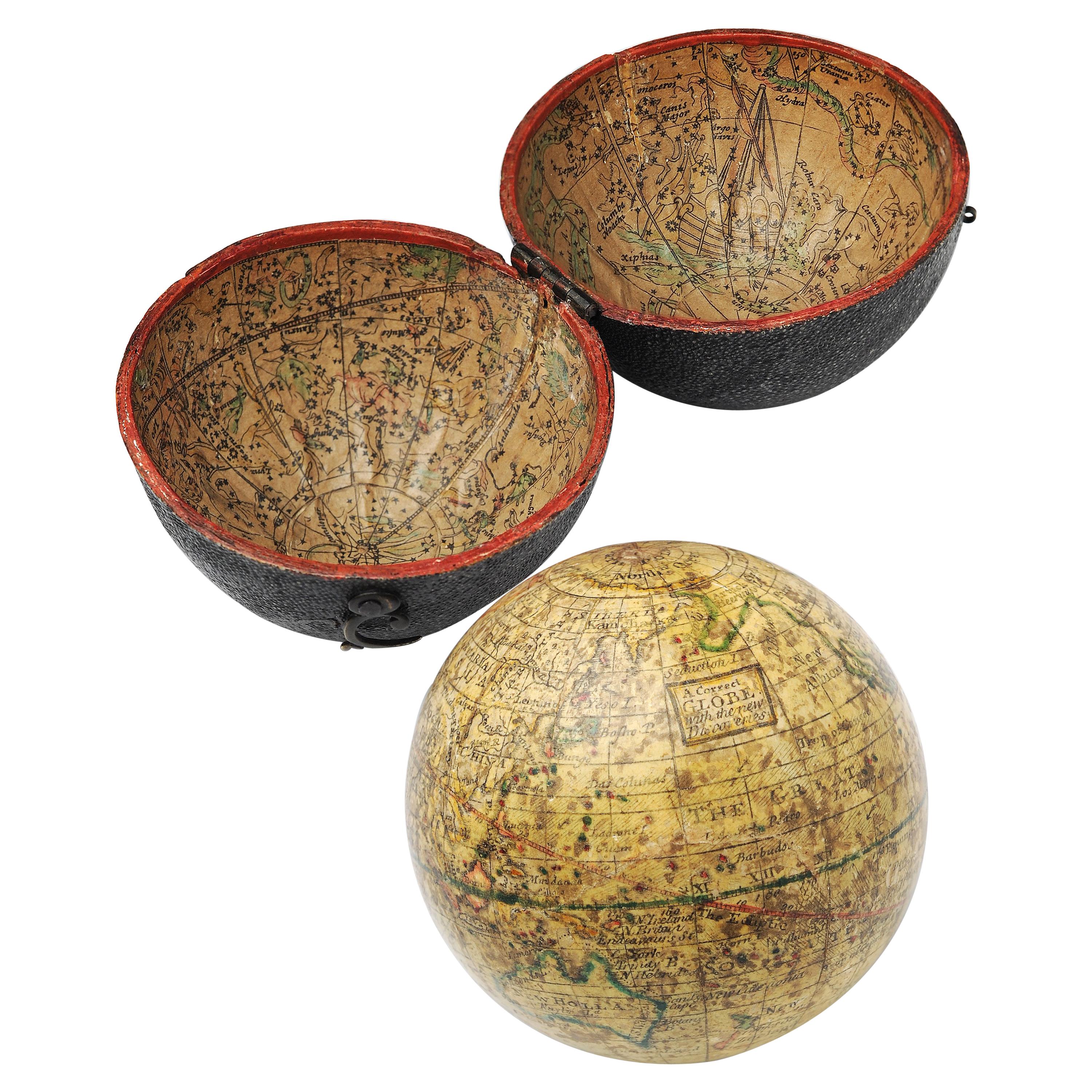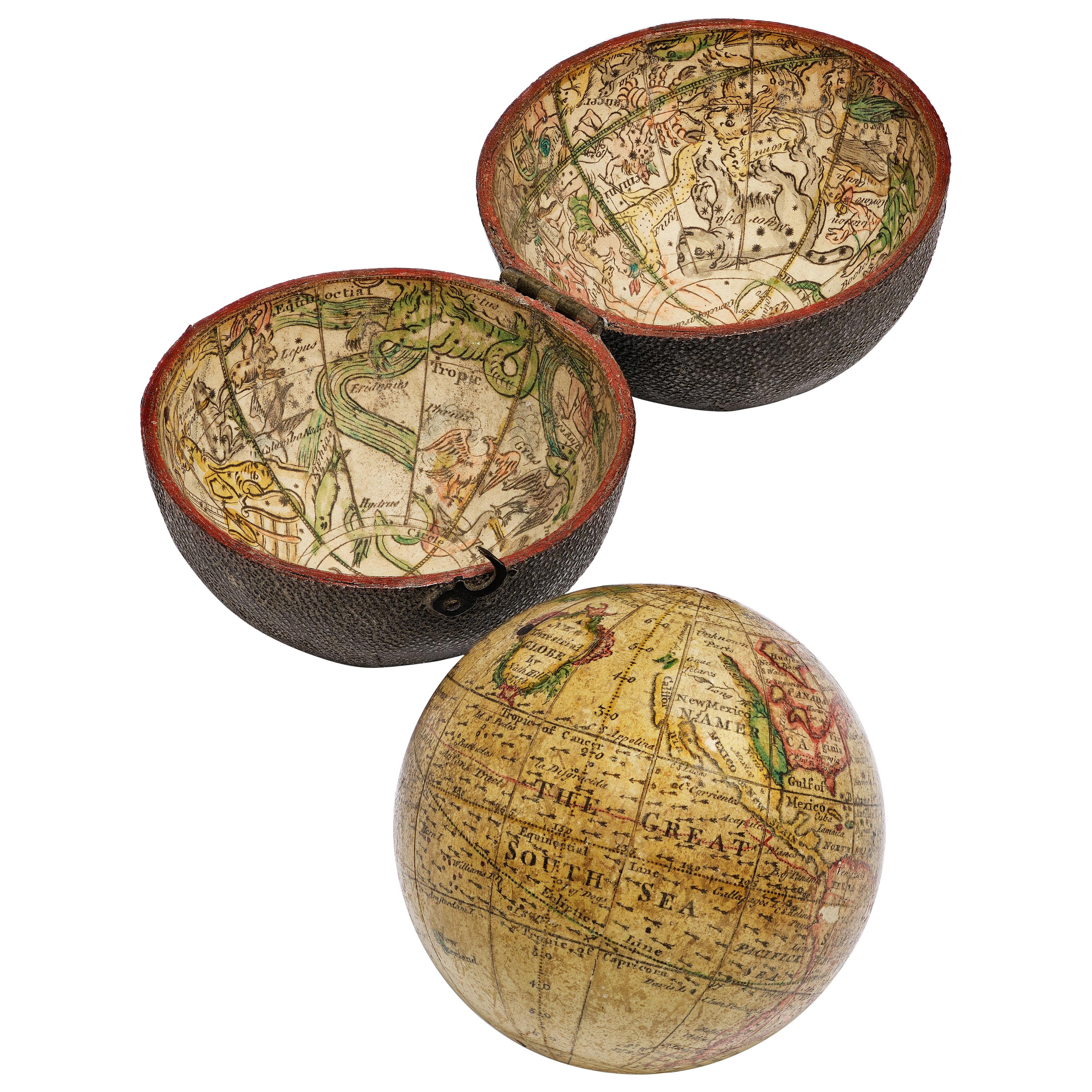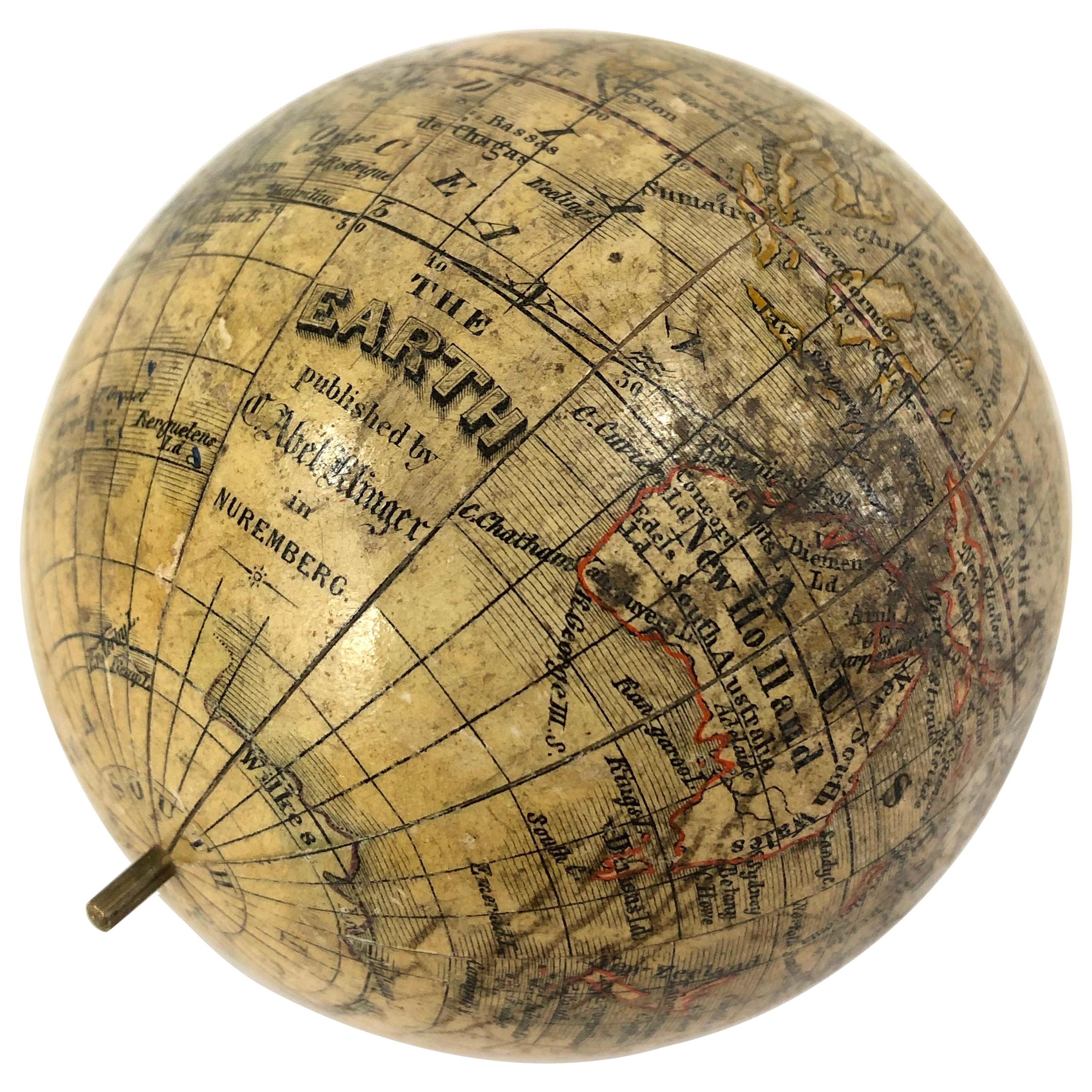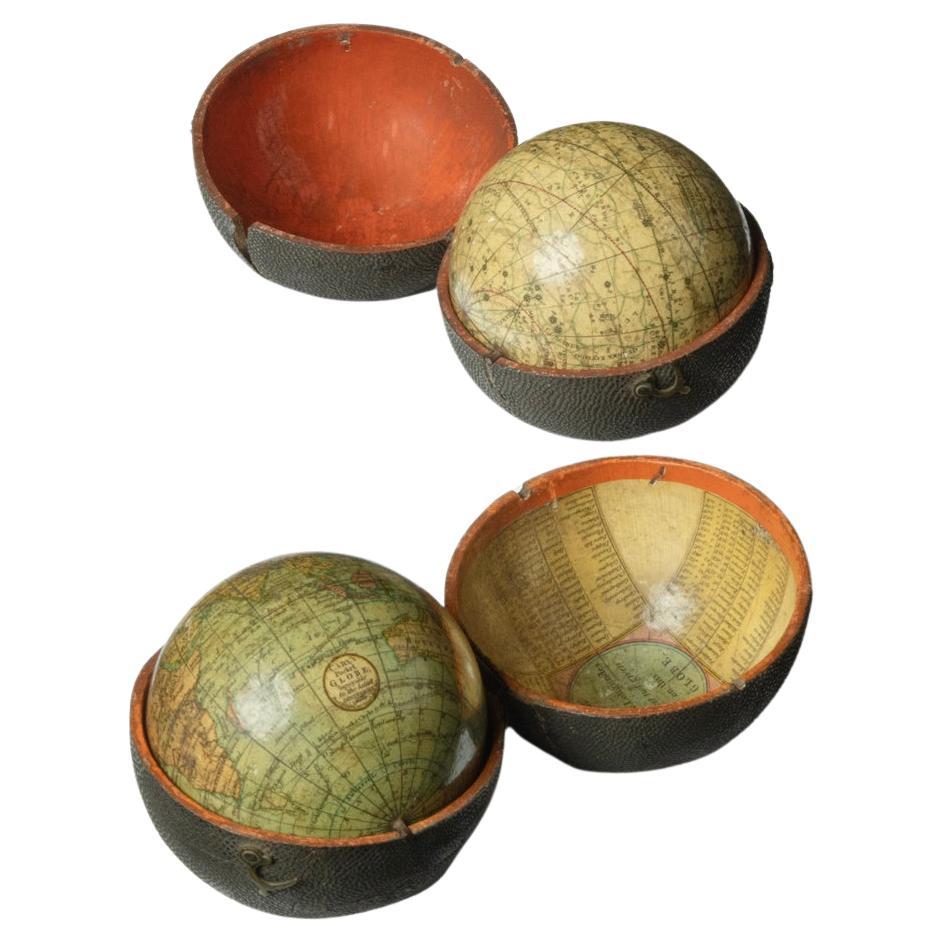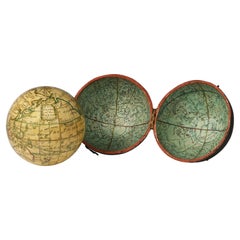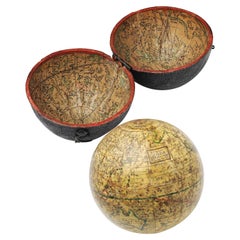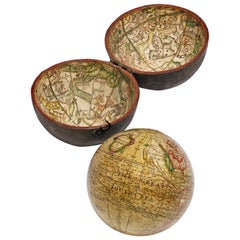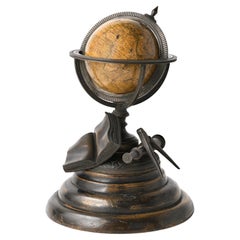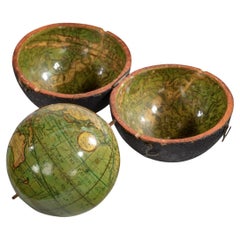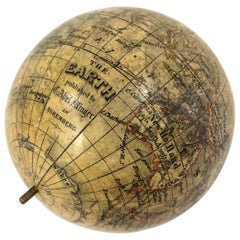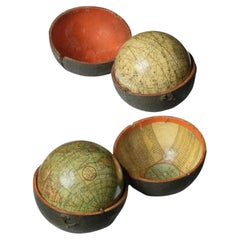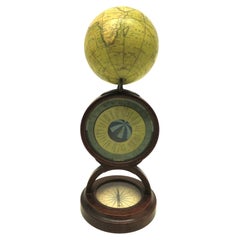Articoli simili a Pocket Globe, Lane, London 1815
Caricamento del video
Vuoi altre immagini o video?
Richiedi altre immagini o video al venditore
1 di 19
Pocket Globe, Lane, London 1815
9000 €IVA inclusa
Informazioni sull’articolo
Pocket Globe
Lane
London, 1815
The globe is contained in its original black leather case.
The sphere measures 2.76 in (7 cm) whereas the case measures 3.15 in (8 cm).
State of conservation: almost excellent. The slightly deformed case has a few minor abrasions and some internal signs of use.
The globe is made up of twelve printed paper gores aligned and glued to the sphere. Two pins are inserted on the poles.
In the North Pacific Ocean, above the Tropic of Cancer, the globe bears a cartouche with the inscription:
LANE’s
pocket
GLOBE
LONDON
1815
On the terrestrial globe, a large part of Africa is empty, and the Great Lakes Tanganyika and Victoria (which Europeans would begin to explore after 1858) are not marked. Australia bears the old name of New Holland (the new name would be introduced after 1824); Tasmania is already reported as an island (Matthew Flinders circumnavigated it in 1798).
Some of the routes of the voyages of Anson and Cook are traced on the map. The pocket globe was likely created after the death of Captain Cook on February 14, 1779, as his place of death, Kealakekua Bay in the Hawaiian Islands, is marked on the map.
South of New Zealand is marked the antipode point of London.
In the South China Sea and the Indian Ocean, the directions of the monsoons are indicated. The Great Wall of China is also depicted on the map.
The pocket globe was published in 1815 (as inscribed in the cartouche) using the plates - with some updated details - of earlier publishers.
The reconstruction of the story is due to Elly Dekker (Dekker, E., Globes at Greenwich, Oxford 1999, pp. 128-129).
Around 1757 James Ferguson began publishing his own pocket globe, of which few surviving copies are known, in at least six different editions. In that same year Ferguson sold his production workshop to Benjamin Martin. The sale almost certainly did not include the engraved plates used to print his pocket globe, because no specimens published by Martin are known. A few decades later these plates came into the possession of Dudley Adams who published the same globe, updating it and replacing Ferguson's name with his own.
Adams went bankrupt in 1817 and the plates were purchased by Lane's workshop, which again updated the maps and replaced Adams' cartouche with the one we find on our specimen. The fact that our pocket globe is dated 1815 probably proves that Adams had already entered into financial difficulty two or three years before he went bankrupt and thus decided to sell some of the engraved plates from his business.
The case consists of two hinged half-spheres covered with black leather; three hooks ensure closure.
Inside the two hemispheres is the celestial vault, on which stars and constellations are indicated in Latin. Many of these are represented by the corresponding mythological figures.
The current state of the research does not allow for the reconstruction of the entire history of the Lane family. They were manufacturers of globes - especially pocket-sized ones - and the founder of the company in the 1770s was almost certainly Nicholas (perhaps a relative of John I, John II or James, all of whom were active in manufacturing scientific instruments for other entrepreneurs, starting from 1733); his son Thomas continued the business until at least the early decades of the nineteenth century. Then it is not clear which family members took over the management of the company. The sources have so far provided the names (George, John), but not the kinship relationships between them; the only certain fact is that the production of Lane-branded globes continued until about the middle of the 19th century.
Bibliography:
P., Van der Krogt, Old Globes in the Netherlands, Utrecht 1984, pp. 180-182;
G., Clifton, Directory of British Scientific Instrument Makers 1550-1851, London 1995, s. v.;
E., Dekker, Globes at Greenwich, Oxford 1999, pp. 393-394.
- Creatore:Lane's (Produttore)
- Dimensioni:Altezza: 8 cm (3,15 in)Diametro: 8 cm (3,15 in)
- Stile:Altro (Del periodo)
- Materiali e tecniche:
- Luogo di origine:
- Periodo:1810-1819
- Data di produzione:1815
- Condizioni:Usura compatibile con l’età e l’utilizzo. Almost excellent. The slightly deformed case has a few minor abrasions and some internal signs of use.
- Località del venditore:Milano, IT
- Numero di riferimento:1stDibs: LU4352246792032
Informazioni sul venditore
4,3
Venditore professionale selezionato
Ogni venditore supera rigorosi standard di autenticità e affidabilità
Fondazione nel 1860
Venditore 1stDibs dal 2018
21 vendite su 1stDibs
Associazioni
International Confederation of Art and Antique Dealers' Associations
- SpedizioneRecupero del preventivo…Spedizione da: Milano, Italia
- Politica di reso
Alcune parti di questa pagina sono state tradotte automaticamente. 1stDibs non può garantire che le traduzioni siano corrette. L’inglese è la lingua predefinita del sito.
Garanzia di autenticità
Nell’improbabile caso in cui si verifichi un problema con l’autenticità di un articolo, contattaci entro un anno per ottenere un rimborso completo. DettagliGaranzia di rimborso
Se il tuo articolo non corrisponde alla descrizione, è danneggiato durante il trasporto o non arriva, contattaci entro 7 giorni per un rimborso completo. DettagliAnnullamento entro 24 ore
Hai un periodo di tolleranza di 24 ore per annullare il tuo acquisto, senza necessità di fornire spiegazioni.Venditori professionali selezionati
I nostri venditori di livello internazionale devono aderire a rigorosi standard di servizio e qualità, garantendo l’integrità delle inserzioni.Garanzia miglior prezzo
Se scopri che un venditore ha pubblicato altrove lo stesso articolo a un prezzo più basso, applicheremo lo stesso prezzo.Consegna globale affidabile
La nostra rete di vettori leader del settore offre opzioni di spedizione specializzate in tutto il mondo, inclusa la consegna personalizzata.Altro da questo venditore
Mostra tuttoPocket Globe, Nicholas Lane, London, post 1779
Di Nicholas Lane
Pocket Globe
Nicholas Lane
London, post 1779
The globe is contained in its original case, which is covered in leather.
The sphere measures 2.75 in (6.9 cm) whereas the case measure...
Categoria
Di antiquariato/d’epoca, 1780s, English, Altro, Modelli e miniature
Materiali
Pelle, Legno, Carta
Globo tascabile inglese, Londra, 1775-1798 circa
Di Herman Moll
Mappamondo tascabile
Londra, tra il 1775 e il 1798
Riedizione del mappamondo di Hermann Moll (1678-1732) datato 1719
Il globo è contenuto nella sua custodia originale, a sua volta ...
Categoria
Di antiquariato/d’epoca, Fine XVIII secolo, Inglese, Giorgio III, Globi ...
Materiali
Zigrino, Carta
Globo tascabile di Nathaniel Hill, Londra 1754
Nathaniel Hill
Mappamondo tascabile
Londra, 1754
Il globo è contenuto nella sua custodia originale, a sua volta ricoperta di pelle di squalo.
La vernice originale della sfera presen...
Categoria
Di antiquariato/d’epoca, Anni 1750, Inglese, Giorgio II, Globi terrestri
Materiali
Zigrino, Carta
Globo terrestre in miniatura Newton and Son London, post 1833, ante 1858
Di Newton and Son
Globo terrestre in miniatura
Newton & Son
Londra, post 1833, ante 1858
Carta, cartapesta, bronzo e Wood
Misura: diametro della sfera 2,95 pollici (7,6 cm); diametro della base in...
Categoria
Di antiquariato/d’epoca, Anni 1840, Inglese, Primo vittoriano, Mappe
Materiali
Bronzo
Globo da 18 pollici, Cary, London, 1840
Di Cary’s
John & William Carys
Aggiornato da George & John Carys
Globo terrestre
Londra, 1840
lb 22 (kg 10)
Lievi abrasioni superficiali dovute all'uso. Una piccola crepa sul cerchio dell'or...
Categoria
Di antiquariato/d’epoca, Anni 1840, Inglese, Primo vittoriano, Globi ter...
Materiali
Carta, Legno
Mappamondo tedesco di C. Abel-Klinger, Norimberga, 1860 ca.
Di C. Abel-Klinger
Globo terrestre
Compagnia artistica C. Abel - Klinger
Norimberga, 1860 circa
H. 31 x 22 cm (12,20 x 8,66 pollici); sfera di 14 cm (5,51 pollici) di diametro
lb 2,30 (kg 1,04)
Stato d...
Categoria
Di antiquariato/d’epoca, Anni 1860, Tedesco, Altro, Strumenti scientifici
Materiali
Legno, Carta
Ti potrebbe interessare anche
Globo tascabile di Regency Lane, datato 1818
Di Lane's
Mappamondo tascabile Regency Lane da 3 pollici e mezzo, datato 1818. Il globo terrestre con i mari in verde chiaro e le masse terrestri delineate in verde più scuro, è contenuto in u...
Categoria
Di antiquariato/d’epoca, Anni 1810, Inglese, Regency, Globi terrestri
Materiali
Legno
Globo terrestre tascabile tedesco in miniatura del XIX secolo
Di C. Abel-Klinger
Un globo terrestre tascabile in miniatura del XIX secolo, del diametro di 3,5 pollici, realizzato da C. Abel-Klinger, Norimberga, Germania, in inglese per i mercati di lingua inglese...
Categoria
Di antiquariato/d’epoca, Anni 1880, Tedesco, Strumenti scientifici
Materiali
Ottone
1069 € Prezzo promozionale
50% in meno
Coppia di globi tascabili di Giorgio III da 3 pollici di J & W Cary, uno datato 1791
Il globo terrestre è applicato con 12 gore incise e colorate a mano e firmato in un cartiglio circolare "Cary's Pocket Globe, Agreeable to the Latest Discoveries". Pubblicato da J. &...
Categoria
Di antiquariato/d’epoca, Anni 1790, Inglese, Globi terrestri
Materiali
Zigrino
Un POCKET GLOBE in inglese con quadrante per i fusi orari
Di Newton and Son
NEWTON & SON (1840-61)
MAPPAMONDO TASCABILE INGLESE CON QUADRANTE PER I FUSI ORARI, 1835 CIRCA
Un supporto inedito per un mappamondo inglese dell'inizio del XIX secolo.
Mappamondo ...
Categoria
Di antiquariato/d’epoca, Anni 1830, Britannico, Altro, Globi terrestri
Materiali
Mogano
10.000 € Prezzo promozionale
20% in meno
Spedizione gratuita
Globo da biblioteca americano dei primi del Novecento
Bel mappamondo da biblioteca con logo dei produttori di Atlas School Supply Co. Base in legno duro con finitura ricca e dettagli curati. Globo celeste con anello equatoriale. Mostra ...
Categoria
Vintage, Anni 1920, Nordamericano, Mappe
Materiali
Legno
Un piccolo globo terrestre di Newton, Londra 1820.
Sopra un piede rotondo che si innalza con un elemento centrale dal profilo mosso è collegato il mezzo meridiano in ottone, che regge alle estremità l'ascia metallica del piccolo glob...
Categoria
Di antiquariato/d’epoca, Inizio XIX secolo, Inglese, Globi terrestri
Materiali
Metallo, Ottone
